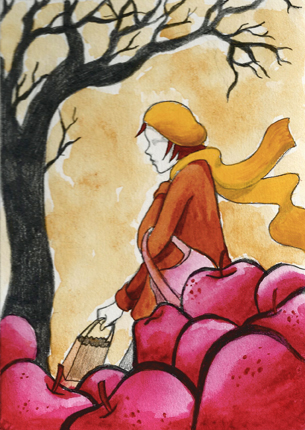PASSAGES
Since everyone wanted a good life, he reasoned, everyone tried to do what they needed to have one. They passed on advice. He gave it. He took it. The days passed. No matter whose he took, he often felt a vague unease. At its root? Something from childhood, probably. He’d explored this with professionals, with some he’d gotten somewhere—but his sense that there ought to be more never really went away. The world was beautiful. Why the discontent? Why was he so often bored?
When he became ill, he wondered, at moments, whether he’d wasted his life. He knew everyone had the same thought. But knowing this didn’t help. He had, while he lay in bed, a number of realizations. Caused by medication? He didn’t care. He hoped, if he got better (which was quite possible) that he’d be able to hold onto them. On some days the news from the doctors was good. He looked at the pale wall while he drank his tea, wondering if he would experience the tremendous illumination he’d heard the dying sometimes felt. But mostly the hospital was boring. Perhaps this meant, he thought, looking out the window at the billowing and in some ways predictable trees, that he wasn’t dying. But he was. It came as quite a surprise, after a journey through a whirling kaleidoscopic, filled with lights, colors, and early memories, that he found himself in heaven. It was very beautiful. His vague unease was gone. He felt a great relief; this lasted a few days.
OBJECTIVITY IN BROOKLYN
Be objective, Ulrike told herself, waiting for the Graham Avenue bus. Alice was needy. She wanted to talk, and then talk more, about her problems with Marie. Ulrike had paid attention —it must be paid, she thought. But not in the way Alice wanted. Not to that extent. Marie was a bartender, she was brilliant (said Alice). She had tattoos, reciprocated feelings—Alice’s—for a while. But not long enough. Ulrike had listened. But not long enough. At least, she thought, that was what Alice thought.
Blossoming dogwoods lined the avenue. The world of things was beautiful, thought Ulrike. Sometimes she thought Alice dwelt too much on pain. Behind her, at the market, people bought fruit. Even people who weren’t beautiful seemed beautiful today, as they paid, in the light, for their fruit. Above, the bird choreography: Somehow, thought Ulrike, they read each other’s thoughts—or movements, as in unison, they swoop. Things weren’t so easy with Alice. Although, Ulrike thought, we too have our patterns. She was pretty sure Alice believed she didn’t take her plight with Marie seriously enough, and Ulrike bristled at this thought. She didn’t (Ulrike thought Alice thought) understand the depth of her pain. Ulrike felt tense when the topic came up: She felt Alice condemned her, or was about to, or easily could. It’s easy, Ulrike told herself, to tell myself Alice wants too much. Be objective. Look down, as if from above. It could just as easily be said, Ulrike told herself, that I give too little. She wondered if it was a weakness to see things from too many points of view.
More people came to wait for the bus. They couldn’t, like the birds, move freely across Brooklyn. Maybe, Ulrike thought, Alice’s belief that I give too little, and mine that she demands too much, are just the products of our individual histories. Or of brain chemistry. Or of our brains’ chemical histories—of some incomprehensible, inner mechanism. More people gathered. One had to be patient. She was patient with Alice, her needs, her difference, her intense, possibly indulgent, feelings. The breeze blew through the dogwoods, the birds swooped, the people waited, the cars passed. Things shimmered. How can objects see other objects objectively?
Ulrike wondered. In the distance, down the avenue, a white-blue blur; maybe the bus.





